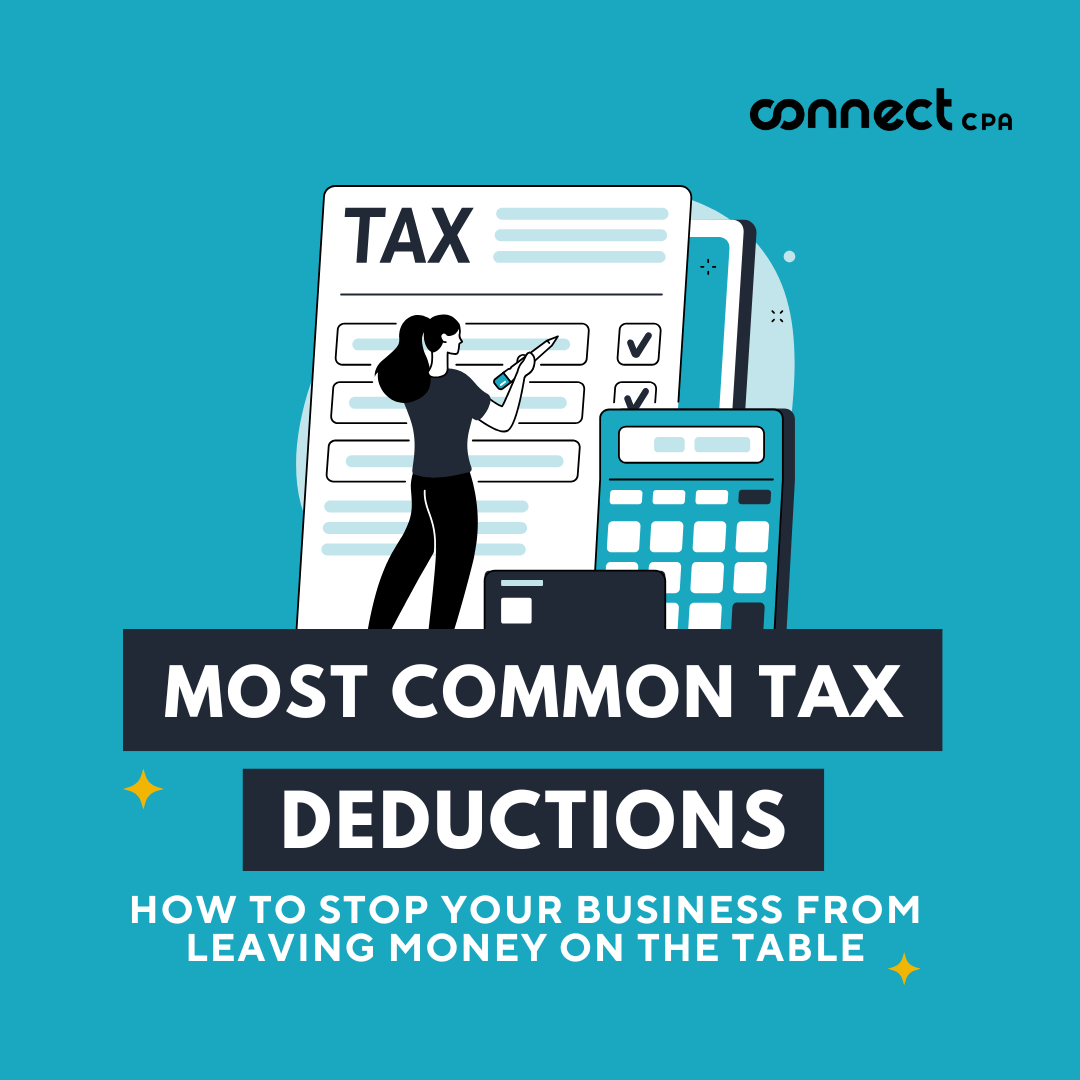
If you’re running a business, chances are you’re already juggling a dozen things before lunch. Between keeping your clients happy, managing your team, and actually growing the business, taxes often fall into the “I’ll-deal-with-that-later” category.
Totally fair.
Until “later” becomes tax season, and with so many moving parts, it's easy to just stick to the basics and overlook deductions that could lead to meaningful savings.
We’ve served over a thousand businesses (from startups to multi-location operations), and we can tell you: even the most organized businesses often miss on deductions they didn’t know existed, or weren’t sure how to claim properly.
Let’s change that. Below is a practical guide to the deductions we see missed most often - clear, simple, and helpful info to keep more money in your business where it belongs.
1. Home Office Expenses
If you work from home, even part-time, you may be eligible to deduct a portion of your rent, utilities, internet, insurance, and more. The amount you can claim usually depends on how much space your home office takes up and whether it’s used exclusively for work.
For example, if your office is 10% of your home’s total space, you can claim 10% of eligible home-related costs. CRA also offers a simplified method (at $2 per day, up to $500), but if you’ve got a dedicated space used regularly for business, the detailed method is often more worthwhile.
Friendly tip: That spot at the kitchen table you work from occasionally - probably not eligible. Your workspace needs to be used mostly (or only) for business.
2. Vehicle Costs
If you use your personal car for business errands, meetings, or deliveries, you can deduct a portion of your vehicle expenses - things like gas, insurance, maintenance, and even depreciation.
The important part here is tracking. CRA wants to see how much of your driving is actually for business. A logbook (even a digital one) makes this easy. Let’s say you drove 20,000 km in a year and 5,000 of that was business-related, you could claim 25% of your eligible expenses.
Keep in mind that without a logbook or mileage tracker, it’s tough to back up your claim in a review.
3. Startup Costs
Starting a business often means legal paperwork, incorporation fees, or reorganizing your structure - all of which come with costs. The first $3,000 of incorporation-related professional fees can usually be deducted right away. Anything beyond that gets claimed over time through something called the Capital Cost Allowance (CCA).
And if you transferred assets (like a personal laptop or desk) into the business when starting out, you may be able to do so without triggering a tax bill, but this does involve a special CRA election and some paperwork.
Startup costs are deductible, but not always immediately. Timing and classification matter.
4. Professional Fees & Subscriptions
Some professional services are deductible like accounting and legal fees tied directly to your business. But not all fees qualify. Personal tax prep or unrelated legal advice are likely not deductible.
The same goes for industry memberships or software subscriptions. If they help you run your business (like Xero, Canva, or your industry association), they likely count. If they’re more for general interest or personal use, probably not.
When in doubt, ask whether the fee directly supports your business operations. If yes, you’re likely in good shape.
5. Bad Debts
Unfortunately, not every invoice gets paid. If you’ve billed a customer, included that income in your books, and made reasonable attempts to collect - but it’s clearly not going to happen - you may be able to claim it as a bad debt.
This helps offset the income you never actually received. Just be sure to keep records of your invoicing and any follow-ups, in case CRA asks for proof.
It’s never fun to write off unpaid work but at least there’s a deduction for it.
6. Meals & Entertainment (Within Reason)
Grabbing lunch with a client and coffee during a business meeting - you can deduct 50% of those costs, so long as there’s a business reason for it.
CRA keeps a close eye on this category, so keep your receipts and jot down who you met and what it was for. A quick note in your accounting software or on the receipt goes a long way.
Keep in mind that this doesn’t include your solo Friday night dinner. If there’s no business purpose, there’s no deduction.
7. Bank Fees & Interest
Business bank accounts and credit cards often have monthly fees, transaction charges, or interest. These can usually be claimed so long as the account is tied to your business.
It’s a small category that’s easy to miss, but it adds up over the course of a year.
General reminder: Keep personal and business banking separate. It makes deductions (and audits) much simpler.
8. Capital Cost Allowance (CCA)
Big purchases like laptops, desks, or office chairs aren’t usually deducted all at once. Instead, you claim part of their cost over time using CCA, which is CRA’s method of depreciation.
Each asset type falls under a “class” with a specific rate. For instance, computers are Class 50 (55% rate), while furniture is Class 8 (20%). In the year you buy the asset, you can only claim half the usual rate (this is called the half-year rule).
9. Training & Education
Courses, webinars, certifications, and books that help you (or your team) sharpen your skills can often be deducted. If the training helps maintain or improve skills for your current business activities, it’s usually fair game.
10. Advertising & Marketing
From digital ad campaigns to flyers, trade show booths, business cards, or social media management, most marketing costs are deductible if they’re helping you grow your business.
Even the costs of developing or redesigning a website can sometimes be claimed, depending on how they’re structured.
If you’re working with international consultants or ad platforms, the tax treatment may vary slightly, but the base expense is often still deductible.
11. GST/HST Input Tax Credits (ITCs) That Often Get Missed
If you're registered for GST/HST, you can recover the tax you pay on most business expenses - this is called claiming an Input Tax Credit (ITC). But many businesses miss ITCs on everyday items.
- Parking receipts: These receipts often don’t show GST breakdowns, but CRA still lets you treat them as tax-inclusive. A $20 parking receipt in Ontario, for example, includes $2.30 in recoverable HST.
- Ride-sharing services: Services like Uber or Lyft include GST/HST in fares, even if it’s not broken out. You can still calculate the embedded tax and claim it.
- Mileage reimbursements to employees: A portion includes recoverable HST. A $100 reimbursement in Ontario includes $11.50 in ITC (100 × 13 ÷ 113).
- The formula: Total amount × tax rate ÷ (100 + tax rate)
Good to know: You can go back up to 4 years to claim missed ITCs (2 years for larger businesses). So if you’ve overlooked a few in past filings, there may still be time to catch up.
12. Re-billable Expenses & Non-Resident Clients
When you pay for something on behalf of a client and re-bill it, GST/HST rules can get a little tricky. If the client is Canadian, you’ll usually charge them GST/HST on the re-billed amount, even if the original expense didn’t have tax on it.
But if the client is outside Canada, you generally won’t charge them GST/HST, though you may still be able to claim an ITC on your original expense.
If you want to explore lesser-known deductions especially those related to GST/HST, check out our previous blog post.
13. Company Social Events
If you’re planning a team holiday party or summer BBQ, and the event is open to all employees (not just a select group), the full cost may be 100% deductible - up to 6 events per year.
This includes venue, food, and entertainment costs, but only if the primary purpose is employee appreciation or morale. Once you go beyond 6 events, the deduction drops to 50%.
Quick tip: Keep an invitation list (even if it’s just an email) in case CRA ever wants to confirm it was open to the team.
Final Thoughts
Tax season doesn’t have to be a guessing game. The CRA offers a surprising number of deductions - but it’s up to you (and your accountant) to claim them properly. Staying organized throughout the year makes this process much easier, and working with a trusted accountant who really understands your business can make a world of difference.
If you’re ever unsure about what’s deductible, it’s always better to ask.
Want to make sure you're not missing anything?
Book a call with our team - we’re happy to take a closer look, offer guidance to your business, and walk you through potential savings.


